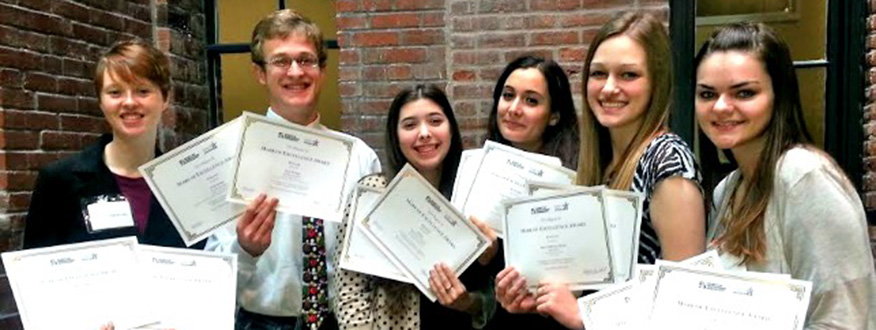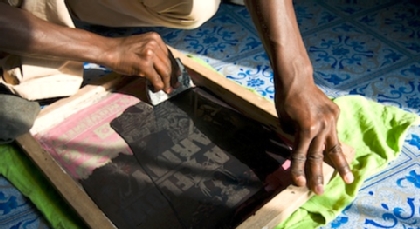Page 216 • (2,965 results in 0.021 seconds)
-
) Second Year: Semester III (Fall) 13 semester hours EDUC 402: Internship I (0) EDUC 403: Building Professional Learning Communities (2) EDUC 404: The Integration of Literacy in Social Studies (3) EDUC 405: Art Methods (2) EDUC 407: Writing Across the Curriculum (2) SPED 404: Collaboration, Team Building, and Supervision (2) SPED 431: Students with Autism Spectrum Disorders (2) Second Year: J-Term II 5 semester hours EDUC 416: Assessment in Early Childhood (2) EDUC 419: Child Guidance and Positive
-
equipment, including video-editing software, as well as providing support for the significant production cost of documentaries. Over the course of the partnership, MediaLab students have received a variety of opportunities at the Tribune – from shadowing reporters to assisting with annual election night coverage. According to Katie Scaff, MediaLab general manager, MediaLab will gain opportunities to try their hand at writing a variety of feature and breaking news stories throughout the year. “Our
-

competed against other regional winners in the same category for consideration of a national. Bjorn Slater scored a national win for his piece, “Accounting for Dummies,” in the division for General Column Writing in the Small School Division. Five regional first place winners come from PLU’s Mast Media team. Alison Haywood ’14, won in the in-depth reporting category for her comprehensive look at sexual assault cases at PLU. Bjorn Slater ’15, won in the general columns category at the regional and
-
HSK and YCT Hanyu Shuiping Kaoshi (HSK) is China’s official, standardized Chinese language proficiency test for non-native speakers. It assesses non-native Chinese speakers’ abilities in using the Chinese language in their daily, academic and professional lives. It consists of a writing test and a speaking test, which are independent of each other. The YCT is the “Youth Chinese Test” for non-native primary and secondary school students. Learn Chinese Confucius Institute supports a number of
-
terms. There may be more days for courses in the summer and January terms. Summer 2024 3 credits GNUR 701 Foundations of Scholarly Writing & Communication (2) GNUR 702 Advanced Practice Roles & Collaboration (1) Fall 2024 10 credits GNUR 703 Theoretical Foundations & Evidence-based Practice (3) GNUR 710 Advanced Patho (3) GNUR 711 Advanced Pharm (3) GNUR 712 Advanced Pharm Discussion (1) January 2025 2 credits GNUR 704 Pop Health, Policy, & Politics (2) Spring 2025 10 credits GNUR 705 Information
-
be more days for courses in the summer and January terms. Summer 2024 3 credits GNUR 701 Foundations of Scholarly Writing & Communication (2) GNUR 702 Advanced Practice Roles & Collaboration (1) Fall 2024 10 credits GNUR 703 Theoretical Foundations & Evidence-based Practice (3) GNUR 710 Advanced Patho (3) GNUR 711 Advanced Pharm (3) GNUR 712 Advanced Pharm Discussion (1) January 2025 2 credits GNUR 704 Pop Health, Policy, & Politics (2) Spring 2025 10 credits GNUR 705 Information Systems
-
Scholarly Writing & Communication (2) GNUR 706: Biostatistics, Analytical Methods, & Epidemiology (3) GNUR 702: Advanced Practice Roles & Collaboration (1) Fall 2024 6 credits GNUR 703: Theoretical Foundations & Evidence-Based Practice (3) GNUR 707: Quality Improvement & Research Methods (3) January 2025 5 credits GNUR 704: Pop Health, Policy, & Politics (2) GNUR 708: Leadership & Resource Management (3) Spring 2025 6 credits GNUR 705: Information Systems & Patient Care Technology (2) GNUR 795: Project
-
and the student create a learning agreement that serves as the syllabus/contract for the course. It specifies: The number of credit hours for the course (calculated with the formula of nine hours of work per week for an entire semester for a four-credit course) The defined period for the independent study (may not be an open-ended process.) Dates for regular meetings between the student and faculty sponsor The reading, research, writing, and appropriate other activities to be carried out The
-
Locating relevant sources is only one step of the research process, but for many students, it’s the end goal. By shifting the focus away from sources as containers of information, the act of locating sources is reframed as one step in a process that changes constantly as more information is gathered and as you learn more about what you are writing. To the seasoned researcher, a source of information will provide details about the context in which the source was created, the process through
-

of our group was sent forward on the flight to Amsterdam, while four members of our group waited in San Francisco for a new flight, that would eventually lead them to Paris. I am writing this after a day spent shivering on the streets of a cold and windy Amsterdam. I am waiting to board my connecting flight to Nairobi and I have a feeling I will get a solid amount of sleep on this flight. Most of our group ventured into the city to explore. I ended up drinking an amazing Cappuccino and eating
Do you have any feedback for us? If so, feel free to use our Feedback Form.


